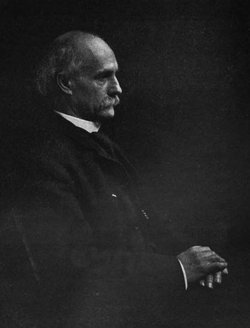Social Reforms of America: Early to Mid 19th Century
Samuel Jane Barrow

In the early 1900s Samuel June Barrow was a leader in prison reform. President Cleveland appointed him International Prison Commissioner for the U.S. in 1895, and in 1900 Barrows became Secretary of the Prison Association of New York and held that position until his death on April 21, 1909.
A Unitarian pastor, Barrows used his influence as editor of the Unitarian Christian Register to speak at meetings of the National Conference of Charities and Correction, the National International Prison Congresses, and the Society for International Law. As the International Prison Commissioner for the U.S., he wrote several of today’s most valuable documents of American penological literature, including “Children’s Courts in the United States” and “The Criminal Insane in the United States and in Foreign Countries.”
As a House representative, Barrows was pivotal in the creation of the International Prison Congress and became its president in 1905.
In his final role, as Secretary of the Prison Association of New York, he dissolved the association’s debt, began issuing annual reports, drafted and ensured passage of New York’s first probation law, assisted in the implementation of a federal Parole Law, and promoted civil service for prison employees. Moreover, Barrows advocated improved prison structures and methods, traveling in 1907 around the world to bring back detailed plans of 36 of the best prisons in 14 different countries.
In 1910 the National League of Volunteer Workers, nicknamed the “Barrows League” in his memory, formed in New York as a group dedicated to helping released prisoners and petitioning for better prison conditions.
A Unitarian pastor, Barrows used his influence as editor of the Unitarian Christian Register to speak at meetings of the National Conference of Charities and Correction, the National International Prison Congresses, and the Society for International Law. As the International Prison Commissioner for the U.S., he wrote several of today’s most valuable documents of American penological literature, including “Children’s Courts in the United States” and “The Criminal Insane in the United States and in Foreign Countries.”
As a House representative, Barrows was pivotal in the creation of the International Prison Congress and became its president in 1905.
In his final role, as Secretary of the Prison Association of New York, he dissolved the association’s debt, began issuing annual reports, drafted and ensured passage of New York’s first probation law, assisted in the implementation of a federal Parole Law, and promoted civil service for prison employees. Moreover, Barrows advocated improved prison structures and methods, traveling in 1907 around the world to bring back detailed plans of 36 of the best prisons in 14 different countries.
In 1910 the National League of Volunteer Workers, nicknamed the “Barrows League” in his memory, formed in New York as a group dedicated to helping released prisoners and petitioning for better prison conditions.
All rights reserved to wikipedia.
